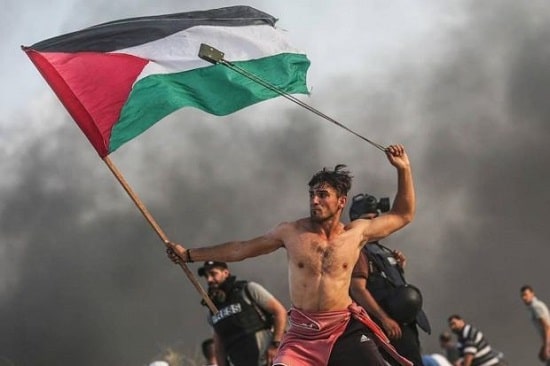
Fight Racism! Fight Imperialism! 268 February/March 2019
The humanitarian crisis in the Gaza Strip continues to intensify under Israeli blockade. On 15 January, the Gaza Health Ministry warned that hospitals throughout the Strip were facing an imminent risk of shutting down due to acute fuel shortages. The consequences of such shutdowns would be dire; Gazan hospitals are already stretched to over-capacity due to the over 10,000 demonstrators who have been seriously injured by Israeli forces since the Great March of Return protests began in March 2018, many thousands of whom require complex surgery. Hospitals in Gaza are also burdened by the long-term effects of the Israeli blockade, in place since 2007, which limits their ability to obtain vital equipment and medicines, leaving many people reliant on continual inpatient care for what would otherwise be treatable conditions. Child patients are particularly vulnerable; that many would die as a result of any shutdown is inevitable.
These fuel shortages have come about as a result of Israel’s decision in October 2018 to block fuel shipments to Gaza. Avigdor Lieberman, Israel’s then-Defence Minister, cited Palestinian ‘terror and violence’ as the reason for the restrictions, a damning admission of Israel’s use of collective punishment against the civilian population of Gaza. Israel seeks to use these measures to crush the resistance of the people of Gaza and the Great March of Return, which has been almost entirely non-violent despite regularly facing Israeli tear gas and sniper fire. A report by the Human Rights and Gender Justice Law Clinic at City University of New York found that Israeli forces have killed 45 children in Gaza since the protests began, concluding that Israeli forces and officials are guilty of war crimes and crimes against humanity as a result. With all indications pointing towards a rise in Israel’s militaristic far-right’s representation in the forthcoming elections in April, there does not appear to be any sign of Israel’s brutality abating. Yet Israel’s repressive strategy has failed to break the spirit of the people of Gaza, who are entering their tenth month of protests.
Meanwhile, the British state is extending its military cooperation with Israel. In September 2019, the Israeli Air Force will take part in joint exercises with the British Royal Air Force (RAF) in Lincolnshire. This will be the first time Israeli fighter jets have trained in British airspace. A future session for RAF fighters to train in Israel is scheduled for 2020. Israel is the third-largest arms supplier to Britain, and Britain has sold £466m of arms to Israel in the last five years, including sniper rifles which have doubtless been used against protesters in Gaza. That the British state and British arms companies are so deeply complicit in Israeli war crimes against Palestinians should be an indication of the level of unyielding solidarity the anti-imperialist left in Britain owes to the Palestinian people.
Palestinian Authority continues to sell out the Palestinian cause
Alongside the protests in Gaza, several demonstrations were called across the West Bank in December and January against the Palestinian Authority (PA), rightly seen by many as little more than an appendage of the Israeli occupation of the West Bank. In December, PA President Mahmoud Abbas announced the dissolution of the Palestinian Legislative Council (PLC) and the holding of a new election for the body in June 2019. The PLC, originally intended to serve as the Parliament of the West Bank and Gaza Strip, has been largely defunct since its establishment in 2006. Following the 2007 civil war between Abbas’s Fatah party and rival Islamist party Hamas, separate governing structures arose in the Fatah-controlled West Bank and Hamas-controlled Gaza. The PLC has never convened in the West Bank, where its authority has been effectively replaced by the PA. Hamas, which won the majority of seats in the 2006 election, continues to convene the PLC but its authority extends to Gaza only. The PLC’s term was meant to expire in 2010, but it has continued to meet in Gaza in the absence of a new election. Hamas has rejected Abbas’s call for its dissolution, insisting that constitutionally only the PLC can dissolve itself and call an election.
Abbas’s call to dissolve the PLC has important political consequences. Despite its inability to function properly, it has always been seen as a possible means of future political unification between the West Bank and Gaza. Calling for its dissolution now, with Hamas’s predictable rejection of that call, means the ensuing election will only extend to the West Bank and will exclude Gaza – further cementing the political separation of the two territories. Effecting that separation has been a priority of the Trump administration and Israel, on whom Abbas and the PA rely to retain their privileges and control over the West Bank. With this latest call, Abbas has signalled his willingness to get in line with US-Israeli plans. The election will also exclude any seats in Jerusalem – a clear deferral to Israel’s desire to annex the city against the wishes of its Palestinian inhabitants.
Abbas’ own term as PA President is long overextended, having officially expired in 2010, but he has continued to govern despite this. He made no mention of a presidential election when announcing the PLC election – ensuring that whatever may happen to the PLC, real power will remain in his hands. In the eyes of many Palestinians, the struggle against Israeli occupation and colonisation of Palestine must begin with a struggle against the corrupt and collaborationist PA.
Wesam Khaled




